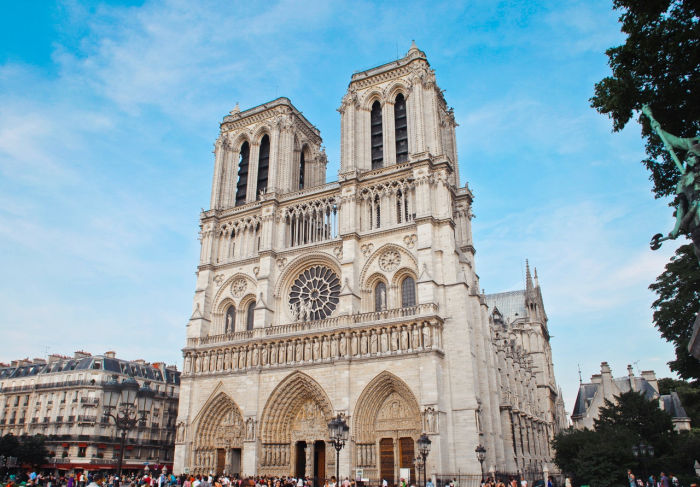Watching Notre Dame, the echoes of Holy Week reverberated. The warning of the temple’s destruction, of course. But also the call to listen.

when in doubt, love
Luke 22:7-13
On Monday, we heard about Jesus weeping over Jerusalem, over the Temple because of what would happen to it in the future.
Then I went to prepare a reflection for Tuesday morning, when Jesus was teaching at the temple.
And while Jesus was there, he spoke loudly of the Temple’s coming destruction; that the revolutionaries would be beaten back and the oppressors would storm the city and destroy its walls.
Jesus was issuing a warning about this place that was in the middle of the people’s relationship with God.
And as I finished, I saw the images of Notre Dame burning.
This pain Jesus was saying to come; its echo was felt Monday. Not the same pain, of course. But a similar sense of fear and loss.
In the midst of tragedy
When Jesus weeps at the destruction to come, he names the root of the existential struggle. Not the sensation of the pain, but of what leads to that pain.
If only they paid attention. They k
This burning cathedral withstood revolutions and world wars. It was brought low this week by an unquenchable fire.
And as the building burned, did we think of those things that make for peace? Were we aware of compassion and generosity, hope, faith, and love?
Or was it just history, pain, confusion?
Was the generous spirit of God in our hearts or was only loss and tragedy on our minds?
We follow
We gather this morning in preparation for the weekend to come.
And our gospel story parallels the preparation at the start of the week.
Then, we had Jesus send disciples out to prepare for their entrance into Jerusalem, to find the colt Jesus would ride on. Now they are to find the place of their Passover meal.
These are strangely specific plans, too. Here’s what you will find and where. Tell them this and they will give it to you. Strange too that they come true.
It feels like prophecy—that Jesus is telling the future—or providence—that God is manipulating things. But I think it’s something else.
I think this speaks far less about the specific acts of God and far more about the specific attitudes of the disciples.
They willingly follow their rabbi.
They follow him into Jerusalem and into these situations which seem ridiculous or impossible. But they follow him regardless.
What do we do?
In the midst of tragedy and confusion, we wonder where God is or what God expects us to do. But we often do it in light of our terms.
- What do we do with my growing older?
- How should we deal with our congregation?
- Should I pay taxes to Caesar or not?
- Or is it right to say you are not a Christian?
Our questions for God are deep and rich and I hope we always keep asking them. But it isn’t the same as following Christ into Jerusalem because we think we’ll get specific answers to our yes or no questions. Yes, do this or no, don’t do that.
But the disciples don’t walk in and go OK, Jesus. Where are we going to eat the Passover? They aren’t so bold or jumpy, itchy to get started!
The picture is completely the opposite. Instead, Jesus tells them and they listen.
OK, go in to the city. You’re going to find this colt tied up…
And then
Listen, when you go in, you’re going to see this man with a jar…
Don’t get me wrong! I love
But this isn’t what we’re doing when we ask them! We think it’s all up to us. So we believe we need to make decisions or ask the questions or seek out Jesus so we can follow him when he’s already there! We don’t have to look for him when he’s supposed to be right in front of us!
What we need to do is just listen.
Listen, love
The Prime Minister is vowing to rebuild Notre Dame. Which, I suppose is fine. It seems like a good thing to do.
And the decisive moves in the hours as the grief became tangible demonstrate a kind of divine synergy we often fail to recognize as Godly.
Perhaps Jesus has been speaking and people are listening and responding. I hope so.
I also hope that we listen to his warnings and teachings. That we hear the words about commitment to the community, to the poor and the powerless. That our attachment to our holy mountains and temples doesn’t eclipse our attachment to God and each other. That these symbols and icons don’t become idols.
These images; the burning cathedral, the stream of light shining down onto the altar, the cross beaming; the universal connection so many have with this one holy site; I hope they kindle our affection for God and each other. I hope they raise our sense of the indomitable Spirit.
Because Jesus is in front of us. I hope we listen.
Always, in the midst of tragedy, we are full of confusion and questions. May we, instead, listen to Christ.
The same Christ who said that the greatest commandment is to love God and love one another. Everything else hangs from those two.
When in doubt, love.
